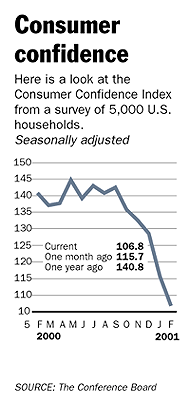 USA Today USA Today
WASHINGTON — Even diehard optimists had little to cheer about after the cascade of gloomy economic data released yesterday.
 U.S. consumer confidence fell to a four-year low this month. U.S. consumer confidence fell to a four-year low this month.
 Durable goods orders sank 6 percent in January from a year earlier. Durable goods orders sank 6 percent in January from a year earlier.
 New home sales, previously a bright spot in the economy, were off almost 11 percent last month from December. New home sales, previously a bright spot in the economy, were off almost 11 percent last month from December.
Together, the data appear to point to a slowdown that could get uglier, though it may skirt recession. The new reports complicate Federal Reserve Chairman Alan Greenspan’s job as he testifies today before Congress for the second time in two weeks. He will have to find a way to bolster confidence without appearing out of touch with the increasingly bleak economic reality.
"The game has changed," says Ian Shepherdson, chief economist at High Frequency Economics. "The two things he cited as positive aspects in the economy two weeks ago — consumer confidence and housing sales — aren’t anymore, and he has to acknowledge that without being mega-gloomy."
The Conference Board’s Consumer Confidence Index fell from 115.7 to 106.8 this month, the lowest level since June 1996.
Its Expectations Index, which is seen as a better leading indicator of economic growth, was even more worrisome. It fell more than 10 points to 68.7 — a figure consistent with a shrinking economy and recession.
"It implies that consumer spending will slow dramatically over the next few months," Shepherdson says.
So far, however, consumer spending has "held up well," Fed Vice Chairman Roger Ferguson said yesterday in a speech that could be a preview of Greenspan’s comments.
The disconnect between consumer confidence and spending poses a challenge to the Fed as it tries to judge whether the economy is heading for recession or just slower growth, he said.
"How these apparently conflicting signals will be resolved going forward is not at all apparent from today’s vantage point, and will bear close scrutiny," Ferguson said. Analysts say Ferguson may be signaling that the Fed needs to see more data before it cuts rates again, which might make a move before the Fed’s March 20 meeting unlikely.
The Fed already has lowered its target interest rate by a full point, to 5.5 percent, last month. So far, the cuts haven’t had any sustained effect on the stock market or consumer confidence. Now the question is whether the economy still has enough momentum to avoid recession.
The data are difficult to read. Durable goods orders plunged 6 percent during January, the government said. But that fall was led by a 22.4 percent decline in aircraft and aircraft parts sales. Strip out volatile transportation orders, and industrial production fell only 0.3 percent.
[back to top] |

 USA Today
USA Today